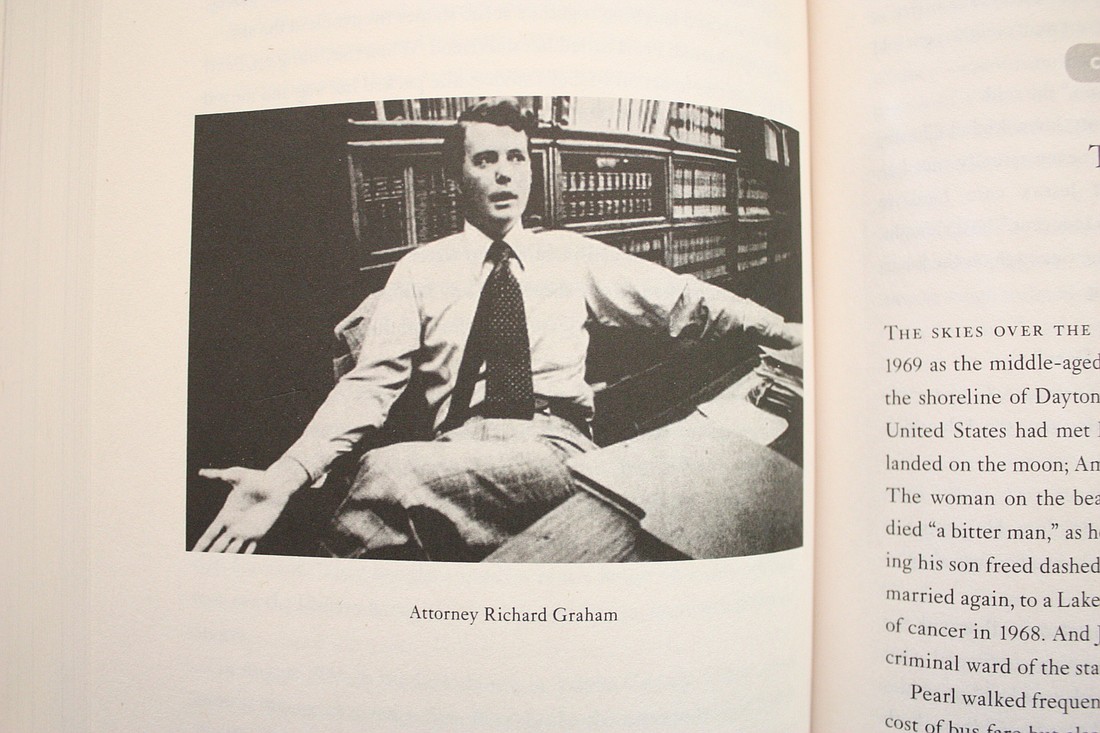- November 25, 2024
-
-
Loading

Loading

After a 50-year career in the law, including serving in the state House of Representatives and as a judge in the 7th circuit, Richard S. "Dick" Graham, of Ormond Beach, says a case he handled as a young lawyer was his top accomplishment.
“I got a case to the Supreme Court and changed a law. I got an innocent guy out,” he said recently.
It was the case of Jesse Daniels, a young man who spent 14 years in a mental institution after being blamed for a crime he did not commit, as chronicled in a book released last year, “Beneath a Ruthless Sun,” by Gilbert King. When taking the case in 1969, Graham set out to not only free Daniels, but also to strike down the Florida law that allowed mentally ill people to be confined indefinitely, even if no danger to themselves or others..
The story would be mostly unknown, if not for King’s book that describes Graham’s years-long efforts, that were ultimately successful.
To honor his achievements, the Volusia County Bar Association has made Graham the first recipient of an award named for him, the Richard S. Graham Power of the Law Award.
Graham, 77, now a mediator at Upchurch Watson White and Max, a mediation firm headquartered in Ormond Beach, said he just happened to be in the right place at the right time when he took the Daniels case.
“Any good lawyer who saw what I saw would have done something,” he said.
The bar is raising money to create a monument in honor of Graham, a bronze bust of him to be displayed on the grounds of the Volusia County Courthouse in DeLand. The bar's Power of the Law Award Committee has a fund-raising goal of $20,000.
For information, contact Executive Director Kathie Selover at 386-253-9471 or [email protected].
FIGHTING THE GOOD FIGHT
Daniels was found incompetent to stand trial for rape in Lake County in 1957, and sent to Chattahoochee Mental Hospital, where he could have spent the rest of his life. The book says that Lake County Sheriff Willis McCall accused the young man, because the husband did not want it known that his wife was raped by a black man. It was a time of segregation, Jim Crow laws and racial violence.
When approached by Daniels’ mother, Pearl, to handle the case in 1969, he was provided evidence of his innocence by newspaperwoman Mabel Reese, who had covered the case from the beginning.
“It was obvious he was innocent,” Graham said.
Graham argued his case to the Florida Supreme Court and a hearing in Lake County, losing both, but won in an appeals court. However, his big victory came when the U.S. Supreme court ruled in his favor. The U.S. Supreme Court received the case automatically after he lost in the state Supreme Court, because it involved the U.S. Constitution.
A trial was ordered for Daniels, but the prosecutors in Lake County dropped the charges. King’s book says that the officials in Lake County did not want a trial, because they feared the victim of the rape would tell the truth on the stand, clearing Daniels and revealing the truth.
Daniels was freed and the state mental health statute was struck down. In 1972, Graham was contacted by Maxine Baker and she asked him to write the Mental Health Act of 1972, which became known as the Baker Act and was copied in other states.
During his reign, McCall was investigated for crimes including fabricating evidence and even murder, but was never convicted. McCall was aided by state attorney for the district, Gordon Oldham. In 2017, the Florida legislature made a public apology for the corrupt regime of McCall and Oldham.
Graham said he wanted “really bad” to see the corrupt officials in jail.
“There was segregation in the country, but it was brutal in Lake County,” he said.
He said Oldham and McCall wanted to see him disappear, too.
Graham spent two years in getting Daniels free, and another two years trying to get compensation for Daniels and his mother. He asked for $177,000, but it was reduced to $75,000 after the award was strenuously fought by Oldham.
THE CLOSER
Graham graduated from Stetson School of Law in 1967, and worked at his father’s firm in DeLand before going to work at Volusia County Legal Services, where he took the Daniels case. He later returned to his father’s firm, where he continued the Daniels case pro bono, because the family was so poor.
Graham handled Baker Act cases while serving as circuit judge. He points out that it provides due process, with legal representation for those charged. If not a danger to themselves or others, the subjects of the Baker Act are freed.
Graham, who has lived in the same Ormond Beach house for about 40 years where he raised a family with wife Bunnie, now stays busy as a mediator at UWWM. It’s standard today for civil cases to be mediated rather than going to trial.
The receptionist at the firm, Eileen Olsen, calls him “the closer” because he settles the cases expeditiously.
“He just knows the law so well,” said Media Manager Catherine Klasne.
“Any good lawyer who saw what I saw would have done something,”
RICHARD GRAHAM, former judge and state representative